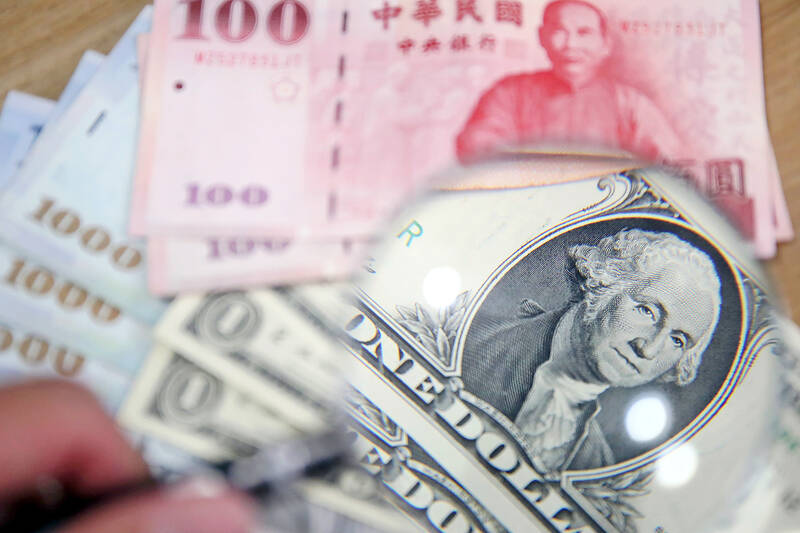The central bank yesterday eased foreign exchange controls by doubling the remittance ceilings for individuals and corporate entities to support the government’s effort to build Taiwan into a regional asset management hub.
From tomorrow, the annual cumulative remittance limit would rise to US$10 million from US$5 million for individuals and to US$100 million from US$50 million for corporate entities, Department of Foreign Exchange Director-General Eugene Tsai (蔡炯民) told a media briefing in Taipei.
“The deregulation is intended to help propel the government’s bid regarding the regional asset management hub, and reflect the nation’s growing economic strength and wealth,” Tsai said.

Photo: CNA
Taiwan’s GDP per capita was US$32,319 last year, up 55 percent from US$20,866 in 2011, while holdings in foreign securities expanded 3.48-fold to US$1.3 trillion from US$0.31 trillion over the same period, he said.
The nation’s foreign exchange reserves last year jumped 48 percent to US$570.6 billion from US$385.6 billion in 2011, adding significant resilience to the local foreign exchange market, Tsai said, adding that the central bank frowns on practices that could weaken its ability to keep the New Taiwan dollar stable.
A stable NT dollar should not be deemed a stumbling block to the development of a regional asset management center, Tsai said, adding that asset management is flourishing in Singapore without a volatile Singaporean dollar because only 10 percent of foreign exchange business involves its local currency.
In other words, people there use major foreign currencies to carry out foreign exchange transactions, leaving the Singaporean dollar largely stable, Tsai said, adding that people in Taiwan like to cite Singapore as an example to follow.
Taiwan can approach the development of the regional asset management center based on the city-state’s model, he said.
The central bank has been criticized for assigning too much importance to a stable currency and being overly conservative in its monetary policy.
Still, the central bank would keep remittance quotas because few individuals and corporations have expressed a need for looser caps, while capital flows linked to foreign trade and the asset management business have been fully liberalized, Tsai said.
Only 50 individuals and 10 companies last year demonstrated a need for relaxed remittance restrictions, and they sought approval from the central bank to address their situations, he said.
Remittances by individuals and corporate entities constituted only 5 percent of the statutory quotas, the central bank said.
Furthermore, a US government bond fund is set to hit US$900 billion next month, in line with a craze among Taiwanese for investment tools that generate fixed income, Tsai said, adding that the asset management business is thriving in Taiwan.

AIR SUPPORT: The Ministry of National Defense thanked the US for the delivery, adding that it was an indicator of the White House’s commitment to the Taiwan Relations Act Deputy Minister of National Defense Po Horng-huei (柏鴻輝) and Representative to the US Alexander Yui on Friday attended a delivery ceremony for the first of Taiwan’s long-awaited 66 F-16C/D Block 70 jets at a Lockheed Martin Corp factory in Greenville, South Carolina. “We are so proud to be the global home of the F-16 and to support Taiwan’s air defense capabilities,” US Representative William Timmons wrote on X, alongside a photograph of Taiwanese and US officials at the event. The F-16C/D Block 70 jets Taiwan ordered have the same capabilities as aircraft that had been upgraded to F-16Vs. The batch of Lockheed Martin

GRIDLOCK: The National Fire Agency’s Special Search and Rescue team is on standby to travel to the countries to help out with the rescue effort A powerful earthquake rocked Myanmar and neighboring Thailand yesterday, killing at least three people in Bangkok and burying dozens when a high-rise building under construction collapsed. Footage shared on social media from Myanmar’s second-largest city showed widespread destruction, raising fears that many were trapped under the rubble or killed. The magnitude 7.7 earthquake, with an epicenter near Mandalay in Myanmar, struck at midday and was followed by a strong magnitude 6.4 aftershock. The extent of death, injury and destruction — especially in Myanmar, which is embroiled in a civil war and where information is tightly controlled at the best of times —

China's military today said it began joint army, navy and rocket force exercises around Taiwan to "serve as a stern warning and powerful deterrent against Taiwanese independence," calling President William Lai (賴清德) a "parasite." The exercises come after Lai called Beijing a "foreign hostile force" last month. More than 10 Chinese military ships approached close to Taiwan's 24 nautical mile (44.4km) contiguous zone this morning and Taiwan sent its own warships to respond, two senior Taiwanese officials said. Taiwan has not yet detected any live fire by the Chinese military so far, one of the officials said. The drills took place after US Secretary

THUGGISH BEHAVIOR: Encouraging people to report independence supporters is another intimidation tactic that threatens cross-strait peace, the state department said China setting up an online system for reporting “Taiwanese independence” advocates is an “irresponsible and reprehensible” act, a US government spokesperson said on Friday. “China’s call for private individuals to report on alleged ‘persecution or suppression’ by supposed ‘Taiwan independence henchmen and accomplices’ is irresponsible and reprehensible,” an unnamed US Department of State spokesperson told the Central News Agency in an e-mail. The move is part of Beijing’s “intimidation campaign” against Taiwan and its supporters, and is “threatening free speech around the world, destabilizing the Indo-Pacific region, and deliberately eroding the cross-strait status quo,” the spokesperson said. The Chinese Communist Party’s “threats